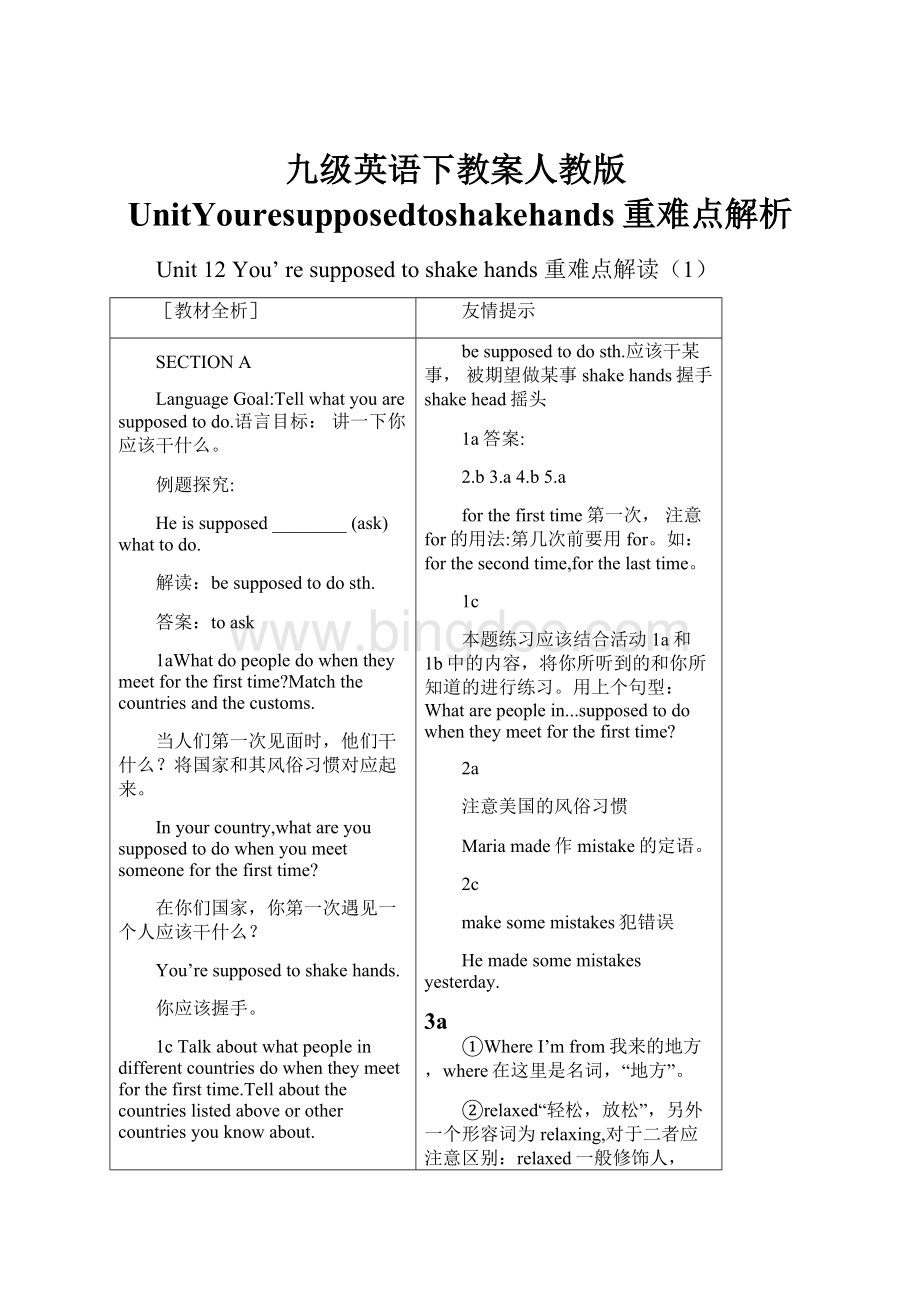九级英语下教案人教版UnitYouresupposedtoshakehands重难点解析.docx
《九级英语下教案人教版UnitYouresupposedtoshakehands重难点解析.docx》由会员分享,可在线阅读,更多相关《九级英语下教案人教版UnitYouresupposedtoshakehands重难点解析.docx(16页珍藏版)》请在冰点文库上搜索。

九级英语下教案人教版UnitYouresupposedtoshakehands重难点解析
Unit12You’resupposedtoshakehands重难点解读
(1)
[教材全析]
友情提示
SECTIONA
LanguageGoal:
Tellwhatyouaresupposedtodo.语言目标:
讲一下你应该干什么。
例题探究:
Heissupposed________(ask)whattodo.
解读:
besupposedtodosth.
答案:
toask
1aWhatdopeopledowhentheymeetforthefirsttime?
Matchthecountriesandthecustoms.
当人们第一次见面时,他们干什么?
将国家和其风俗习惯对应起来。
Inyourcountry,whatareyousupposedtodowhenyoumeetsomeoneforthefirsttime?
在你们国家,你第一次遇见一个人应该干什么?
You’resupposedtoshakehands.
你应该握手。
1cTalkaboutwhatpeopleindifferentcountriesdowhentheymeetforthefirsttime.Tellaboutthecountrieslistedaboveorothercountriesyouknowabout.
谈论在不同的国家里当人们第一次见面时他们干什么。
谈一谈上面列举的或者你知道的国家。
A:
WhatarepeopleinKoreasupposedtodowhentheymeetforthefirsttime?
在朝鲜,人们第一次见面应该干什么?
B:
They’resupposedtobow.
应该鞠躬。
2aMariaisanexchangestudent.LastnightshehaddinneratanAmericanfriend’shouse.Listenandcheck(√)themistakesMariamade.
玛丽娅是一个交换生。
昨天晚上她在一个美国朋友的家里吃晚饭。
听录音然后在玛丽娅所犯的错误前打√。
2cRoleplaytheconversationbetweenMariaandDan.Usetheinformationfromactivities2aand2b.
分角色表演玛丽亚和丹的对话,用活动2a和2b中的信息。
Well,itwasOK,butImadesomemistakes.Iwassupposedtoarriveat7:
00,butIarrivedat8:
00.
哦,挺不错的,但是我犯了一些错误,应该7点到;可我8点才到的。
3aReadthefollowingopinionsofaColombianandaSwissstudentandfillinthechart.
读下面哥伦比亚和瑞士的学生的观点然后填写下表。
好句共享:
1.WhereI’mfrom①,we’reprettyrelaxed②abouttime.
我来的地方,对于时间相当宽松。
例题探究:
Heispretty________whenheishavinga________vacation.(relax)
解读:
当他正过着轻松的假期的时候,他相当放松。
第一个修饰人,第二个修饰物。
答案:
relaxed。
relaxing
2.Weoftenjustdropby③ourfriends’homes④.
我们经常拜访我们朋友的家。
例题探究:
Thisis________________________________________________(小明和小刚的房间).
解读:
两人共有的所有格应在两人后面加’s。
答案:
XiaoMingandXiaoGang’sroom
3.Wedon’tusuallyhavetomakeplanstomeetourfriends.
我们不用经常制订计划来会见我们的朋友。
haveto不得不makeplans制定计划
4.Oftenwejustwalkaround⑤thetowncenter,seeing⑥asmanyofourfriendsaswecan⑦!
经常我们只是到市中心四处走走,同时尽可能多的见见我们的朋友!
例题探究:
Heruns________________________________________(尽快地跑).
解读:
尽可能的是as...asonecan,run是动词,因此as...as中间需要副词。
答案:
asquicklyashecan
5.Also,wenevervisitafriend’shousewithout⑧callingfirst.
同样,我们绝不事先没有打电话就去拜访朋友。
例题探究:
Heleftwithout________(say)aword.
他一句话没说就走了。
解读:
without后跟动名词。
答案:
saying
6.Weusuallyplantodosomethinginteresting,orgosomewheretogether.
我们经常计划去做有趣的事情,或者一起去某个地方。
plantodosth.计划干某事
somethinginteresting有趣的事情(注意形容词修饰合成不定代词,形容词要后置)
gosomewhere去某个地方
3bRoleplayaconversationbetweenTeresaandMarc.TalkaboutthedifferentattitudesinColombiaandSwitzerland.
分角色表演特丽莎和马克的对话,谈论一下对哥伦比亚和瑞士的不同态度。
Well,theyhaveprettyrelaxedrules①.
嗯,他们有相当宽松的规则。
Likewhat?
例如?
Well,it’sOKifyou’renotontime②.
如果你不按时是可以的。
4ANewstudentfromEnglandisgoingtotakeclassesatyourschool.Fillinthechartwiththethingsheorsheissupposedtodoinsideandoutsidetheclassroom.Thenroleplayaconversation.
一个来自英国的新生要在你们学校上课。
把她或他在教室里和教室外应该干的事情填写下表。
然后分角色表演对话。
A:
CanyoutellmethethingsI’msupposedtodo①?
你能告诉我应该干的事情吗?
B:
Thefirstthingistogreet②theteacher.
第一件事情就是问候老师。
SECTIONB
1Howmuchdoyouknowabouttablemannersaroundtheworld?
Takethefollowingquiz.Circle“T”(fortrue)or“F”(forfalse)aftereachsentence.
关于世界上的餐桌礼仪你知道多少?
做下面的小测验,在每个句子后面正确的圈“T”,错误的圈“F”。
Mindyourmanners!
注意你的礼貌!
1.IntheUnitedStates,you’renotsupposedtoeatwithyourhands①.
T
F
2.InPeru,youarenotsupposedtotalkatthetable②.
T
F
3.InChina,you’renotsupposedtopickup③ourbowlofrice.
T
F
4.InKorea,theyoungestpersonissupposedtostart④eatingfirst.
T
F
5.InBrazil,youshouldwipeyourmouthwithyournapkineverytime⑤youtakeadrink.
在巴西,你应该在每次你喝酒时用餐巾纸擦嘴。
T
F
2aTomorrowSteveisgoingtoJapantobeanexchangestudent.HisJapanesefriendSatoshiistellinghimaboutthetablemannersinJapan.Listen.NumberthepicturesintheorderSatoshitalksaboutthem.
明天史蒂夫将要去日本当一名交换生。
他的日本朋友Satoshi正在告诉他关于日本的餐桌礼仪。
听录音,把Satoshi谈论的图片按正确的顺序编号。
2bListenagain.Matchthesesentenceparts.
再听一遍,将这些句子搭配起来。
a.tomakenoisewhile①eatingnoodles.
吃面条时发出声音。
b.tostick②yourchopsticksintoyourfood.
把你的筷子插进你的饭里。
c.pointat③anyonewithyourchopsticks.
用你的筷子指别人。
d.eatordrinkwhilewalkingdown④thestreet.
沿着街道走时吃或喝东西。
2cTalkaboutthetablemannersinyourcountry.
谈论你们国家的餐桌礼仪。
A:
We’resupposedto...
B:
Yes,andit’srudeto...
3aReadthee-mailmessagefromWangKunandanswerthequestions.
读这封来自王坤的电子邮件并回答问题。
Subject:
TableManners!
主题:
餐桌礼仪
From:
WangKun来自:
王珅
好句共享:
1.Thanksfor①yourmessage.
谢谢你的信息。
例题探究:
Thanksforyour________(invite).Andthanksfor________(have)me.
解读:
谢谢你的邀请,your后跟名词,而for后跟动名词。
答案:
invitation。
having
2.I’mhavingagreattime②onmyexchangeprograminFrance.
我在法国的交换工程中过得相当愉快。
onone’sexchangeprogram进行交换工程
3.It’sevenbetterthanIthoughtitwouldbe③.
它比我原先考虑的甚至还要好。
evenbetter“甚至更好”,even来修饰比较级表示程度。
你记得还有哪些单词来修饰比较级吗?
(much,alot,alittle,abit,still,far等)
4.Theygooutoftheirway④tomakemefeelathome⑤.
他们费尽心思让我感到自由自在。
5.Ihavetosay,Ifinditdifficulttoremembereverything⑥,butI’mgraduallygettingusedtothings,anddon’tfindthemsostrangeanymore.
我得说,我发现每件事情都记住很难,但我渐渐地习惯了这些事情,并且不再觉得奇怪了。
例题探究:
(1)Ifinditinteresting________(study)English.我发现学英语很有趣。
(2)Heisgettingusedto________(live)onthefifthfloor.
6.Hopeyou’rehavingagoodschoolyear.祝你本学年愉快。
本句为祈使句,注意反意问句:
willyou?
haveagoodschoolyear学年过得愉快
3bImaginethatyouareStevefromactivty2b.Writeane-mailmessagetoafriendaboutthetablemannersinJapan.
设想你是来自于活动2b中的史蒂夫。
给一个朋友写一封关于日本餐桌礼仪的电子邮件。
Herearesomethingsyouneedtoknow①abouttablemannerswhenyouvisitJapan,firstofall②,youshould____________.
3cWriteane-mailmessagetellingsomeonefromanothercountryaboutthetablemannersinyourcuntry.
写一封有关你们国家餐桌礼仪的电子邮件告诉某个来自另一个国家的人。
SELFCHECK
1.Fillintheblankswiththewordsgiven.Thenmakeyourownsentenceswiththewords.
用所给的单词填空,然后用这些单词造句。
2.ReadaboutFanLing’sexperienceinawesternrestaurant.ThinkabouthowyouwouldsolveherproblemandfinishFanLing’sstory.
读范玲在西方餐馆里的经历。
考虑你将会怎样来解决她的问题并且完成范玲的故事。
好句共享:
1.Everythingwasunfamiliar①.
(我)对每件事都不熟悉。
2.AndIhad,notjustonesettouse,but②twoorthreeofeach.
并且我必须,不仅使用一套,而且是每顿饭用两三套刀叉。
3.WasIsupposedtobeginwith③thelargestonesorthesmallest?
我应该从最大的开始还是最小的开始?
3.Completethecrossword.完成字谜。
Down纵向
Across横向
1.JapaneseandKoreandothiswhentheymeetpeople.日本人和韩国人遇到人时这样做
4.YoueatwiththeseinJapan,Korea,andChina.在日本,朝鲜,中国你们用这种东西来吃饭。
2.Americansdothiswiththeirhandswhentheymeetpeople.美国人见面的时候用手这样做。
5.YoucutyourfoodwiththisintheUnitedStates.在美国你用这个来切食物。
3.BraziliandothisinBrazilwhentheymeet.在巴西人相见的时候这样做。
JustforFun!
小笑话!
Youweresupposedtogetherahat,notacat!
你应该给她一顶帽子而不是一只猫!
Reading:
You’resupposedtowritequickly!
你应该快点写!
Section1
1aCanyoureadthefollowingexpressions?
HowwouldyouusuallywritetheminEnglish?
你会读下面的短语吗?
你通常用英语如何写它们?
1bWriteanymoreexpressionsliketheonesabove.
写出更多的像以上这样的短语。
Section2
LearningStrategy学习策略
CO-OPERATIVE①LEARNING
合作学习
Twobrainscanusuallythinkbetterthanone,andfastertoo.Tobecreativeortolearnbetter,worktogetherwith②somebody,andbeinspired③bythem.Shareyourideas.
两个大脑通常能比一个考虑的既好又快。
为了有创造力并且学的更好,跟别人在一起工作,能够受到他们的鼓励。
分享你的观点。
好句共享:
1.E-mailEnglishisanewkindof①writtenEnglish②thatisbeingused③tosavetime④.
电邮英语是一种新型的正被用于节省时间的书面英语。
(1)isbeingusedtosavetime正被用于节省时间。
在这里是现在时行时态的被动语态,beusedtodoing“习惯于干”,usedtodo“过去常干”。
Computersarebeingusedtoworknow.
电脑现在正被用来工作。
2.Whenyouwritee-mailEnglishyoudonotneedtousepunctuationmarks⑤onlyinthetraditionalway⑥.
当你写由邮英语的时候你不必仅仅用传统的方式来使用标点符号。
3.Themostcommon⑦oneisthehappyface—itlookslikethis:
)anditismadewithacolonandarightbracket⑧besideit.
最普通的一个就是笑脸-它看起来像这样:
),并且它是由一个冒号和旁边一个右括号构成的。
4.Youcanlearniteasilybyyourselves⑨,andexperimentwith⑩yourownideas.
你能够很容易的自学,并且用你自己的观点来进行实验。
(1)learn...byoneself同义短语:
teachoneself
IlearnEnglishbymyself.
IteachmyselfEnglish.我自学英语。
Section3
3aWritethenamesofthe3typesof①e-mailEnglishatthetopof②eachcolumn.Thenwriteanexampleofeachfromthereading.
在每一栏顶端写出三种电邮英语的类型。
然后写出文章中出现的每种类型的一个例子。
3bScanthereadingtoanswerthesequestions.
浏览课本来回答这些问题。
Section4GoForIt!
达成目标!
Completethechart.Thenconsiderthequestionsbelow.Circleyouranswers.Discussyouranswerswithapartner.
完成这个图表,然后思考下面的这些问题,与一个同伴一起讨论你圈出的答案。
1.Whosee-mailEnglishin1and2doyouprefer?
在1和2中你更喜欢喜欢谁的电邮英语?
2.Wasiteasierandfastertodo3and4byworkingtogether?
通过合作做3和4更容易更快吗?
besupposedtodosth.应该干某事,被期望做某事shakehands握手shakehead摇头
1a答案:
2.b3.a4.b5.a
forthefirsttime第一次,注意for的用法:
第几次前要用for。
如:
forthesecondtime,forthelasttime。
1c
本题练习应该结合活动1a和1b中的内容,将你所听到的和你所知道的进行练习。
用上个句型:
Whatarepeoplein...supposedtodowhentheymeetforthefirsttime?
2a
注意美国的风俗习惯
Mariamade作mistake的定语。
2c
makesomemistakes犯错误
Hemadesomemistakesyesterday.
3a
①WhereI’mfrom我来的地方,where在这里是名词,“地方”。
②relaxed“轻松,放松”,另外一个形容词为relaxing,对于二者应注意区别:
relaxed一般修饰人,relaxing一般修饰物。
其动词为relax,名词为relaxation。
③dropby拜访
④ourfriends’homes名词所有格
如:
Lucy’shouse,thewindowofthehouse,afriendofmine.
⑤walkaround四处走走
⑥seeing在这里作伴随状语
⑦as...asonecan“尽可能的……”,同义词相当于:
dowhatonecan。
⑧without介词,“没有”,后跟动名词,其反义词为with。
3a答案:
Colombia:
Weareprettyrelaxedabouttime.
Weoftenjustdropbyourfriends’homes.
Wedon’thavetomakeplanswhenwegettogetherwithfriends.
Switzerland:
It’sveryimportanttobeontime.
Wenevervisitafriend’shousewithoutcallingfirst.
Weusuallymakeplanstomeetfriends.
3b
①have